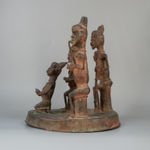Yoruba Ceremonial Group Sculpture, Nineteenth to Twentieth Century AD
Bronze
35 x 26 x 26 cm
13 3/4 x 10 1/4 x 10 1/4 in
13 3/4 x 10 1/4 x 10 1/4 in
CC.521
Further images
-
(View a larger image of thumbnail 1
)

-
(View a larger image of thumbnail 2
)

-
(View a larger image of thumbnail 3
)

-
(View a larger image of thumbnail 4
)

-
(View a larger image of thumbnail 5
)

-
(View a larger image of thumbnail 6
)

-
(View a larger image of thumbnail 7
)

-
(View a larger image of thumbnail 8
)

-
(View a larger image of thumbnail 9
)

The Yoruba of West Africa (Benin, Nigeria and Togo, with migrant communities in parts of Ghana, and Sierra Leone) are responsible for one of the finest artistic traditions in Africa,...
The Yoruba of West Africa (Benin, Nigeria and Togo, with migrant communities in parts of Ghana, and Sierra Leone) are responsible for one of the finest artistic traditions in Africa, which remains vital and influential still today.
This figure was created in the shadow of two mighty Nigerian empires. These were the Yoruban polity – which remains the most powerful indigenous entity in Nigeria, if not Africa – and the eminent kingdom of Benin. Benin metalworkers came to the world’s attention in 1897 following the British punitive expedition that sacked and burnt the capital, but the Yoruba polity, which survived much better, was equally skilled if stylistically distinct in some respects. The relationship between these two groups and the much earlier Ife culture is also uncertain. The technology of bronze and copper smelting, ironworking and sculpting in a range of materials that included ivory was extremely refined and effective; indeed, smelting, forging and cire perdue (lost wax) metalworking methods exceeded any seen in Europe until the 19th century. The complexity of the method – carving the item in wax then casting it in metal in a clay mould – was exacerbated by the detail and structural parameters of the figures.
This is a beautiful piece of Yoruba art, befitting a refined collector.
This figure was created in the shadow of two mighty Nigerian empires. These were the Yoruban polity – which remains the most powerful indigenous entity in Nigeria, if not Africa – and the eminent kingdom of Benin. Benin metalworkers came to the world’s attention in 1897 following the British punitive expedition that sacked and burnt the capital, but the Yoruba polity, which survived much better, was equally skilled if stylistically distinct in some respects. The relationship between these two groups and the much earlier Ife culture is also uncertain. The technology of bronze and copper smelting, ironworking and sculpting in a range of materials that included ivory was extremely refined and effective; indeed, smelting, forging and cire perdue (lost wax) metalworking methods exceeded any seen in Europe until the 19th century. The complexity of the method – carving the item in wax then casting it in metal in a clay mould – was exacerbated by the detail and structural parameters of the figures.
This is a beautiful piece of Yoruba art, befitting a refined collector.








